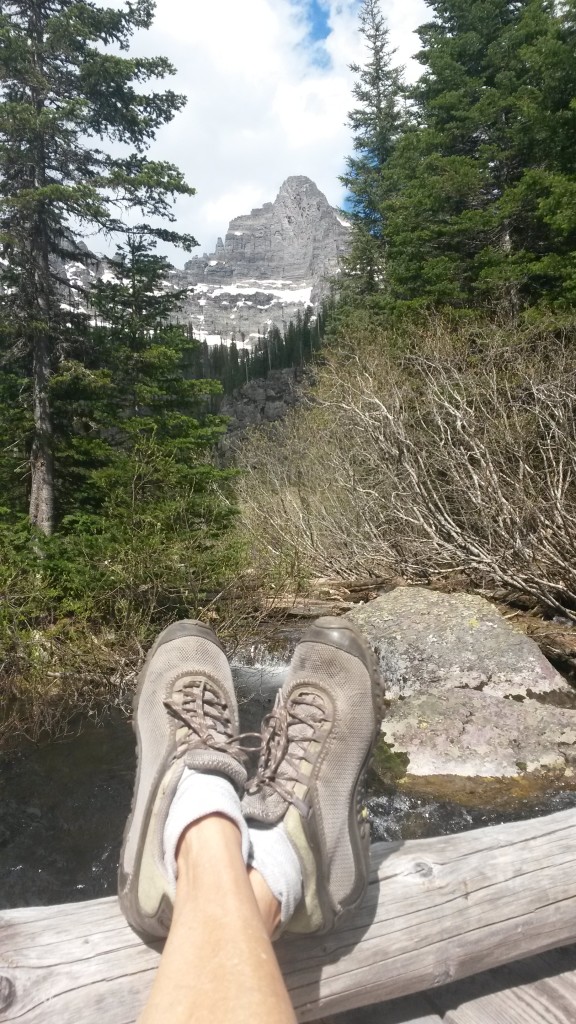Calm Vigilance
There’s something to be said for scanning the environment – for reading the room – for casing the joint.
I’ve just spent four days in the Northern Rockies with my husband. Attending literary events, sitting in restaurants and coffee shops, walking spring green trails, and hiking to a high mountain lake – one laid down tens of thousands of years ago by an already slow-moving glacier.
On the hike, we carried bear spray. The Grizzlies are awake and eating all they can find so on the very off chance we would startle one, the spray is a reasonable companion. Sort of like high boots in rattlesnake country. Neither of these precautions makes much difference, though, if there isn’t also a certain vigilance – a watching, an active scan.
It’s a quality of attention that is simply practical. Given the human proclivity for fearfulness (even when it masquerades as bravado) the necessity for vigilance can pretty easily be linked with anxiety. Usually that kind of attention rests in a sense of separation and, thus, vulnerability. And usually anxious vigilance obscures the other option – to scan out of calm – out of relatedness.
I had coffee last week with my friend Dr. Dapo Sobomehin. We’ve met over coffee many times, now – one of them the time Dr. Dapo consented to be one of the voices in 100 VOICES – AMERICANS TALK ABOUT CHANGE. Last week he reminded me of a conversation we had during the 100 VOICES interview. “We Yoruba people always pay attention,” he said. “We always see everyone in the coffee shop. We know where they are, what they look like. We have a small sense of how their day is going, happy or sad.”
I remember asking Dr. Dapo the first time about the motive for that vigilance. His reply, “We love everyone. We’re all related to each other all the time, so we must keep up with each other.” Dr. Dapo means this about everyone. He’s very clear about it. He’s lived full-time in the U.S. since 1961 when he arrived from Nigeria as an exchange student. He’s had children here, as have they. “Doesn’t matter where you are or where you are from,” he says from a cultural sensibility deep in his being, “We must all take care of each other.”
The last time I sat across the table from my friend Donnie was over a year ago – February. We were at a Panda Express in the urban neighborhood where Donnie grew up. He was just back from India and had wrapped a light green scarf around my neck that he’d dipped in the River Ganga just a week earlier. I remember the warmth.
Donnie’s vigilance became acute the minute we walked into the building. This neighborhood and its larger community have been viciously dangerous throughout Donnie’s life and experience. At times he’s been a too-active participant. His skills for reading the social environment were always about survival, but in the past decade, Donnie’s shifted profoundly from vigilance out of anxiety to protective but calm attentiveness. He doesn’t expect or even dread explosive confrontation, but like a true warrior, he is prepared.
Calm vigilance. Attention that is related and prepared. The other day in Grizzly country I found myself thinking about this. “Out here in the wild world,” my thoughts said, “there’s really no edge between life and death, between beautiful and hideous, between holy and profane.” Cool idea, but just beneath it was the possibility of abject terror.
Out there in wild nature I had the option of being in constant fear of the 700 or so Grizzly Bears in the 9600 square miles surrounding the trail I was on. Vigilance was only wise, but indulging that anxiety would prevent my perception of anything living, beautiful and holy going right where I was.
I can’t say I’ve perfected calm vigilance. But I can see that I’m on my way. And I know for sure that I have some great teachers: Dr. Dapo, Donnie, and my mountain man husband – the man hiking beside me who heard rustling, saw motion, flipped the safety off the bear spray, and just as quickly knew from his more than 50 thousand hours in the wild – that the way was clear. “Likely an ungulate,” he said. “A Deer or an Elk. They startle, but then they’re amazingly silent making their way to safety.” Then in response to my questioning, “Yeah, if it had been a Grizzly, it would have kept on crashing.”
He put the safety back on the spray, lifted his eyes and said, “did you see those falls up there?” A thousand feet above where we stood, small ribbons of snow melt tumbled over craggy cliff edges. “We’re lucky to catch sight of those,” he said. “Spring runs like that don’t last very long.”
 Clare Consultation, LLC
Clare Consultation, LLC
Mary I love these words and reflections. I have the same feelings as I hike alone in nature often, and try to acknowledge my reasonable fears while staying present for the wonder. Thanks for sharing your ideas and the idea of your Yoruba friend.
Thank you for this, Mary Clare. What a great interweaving of place, people, and bear spray!